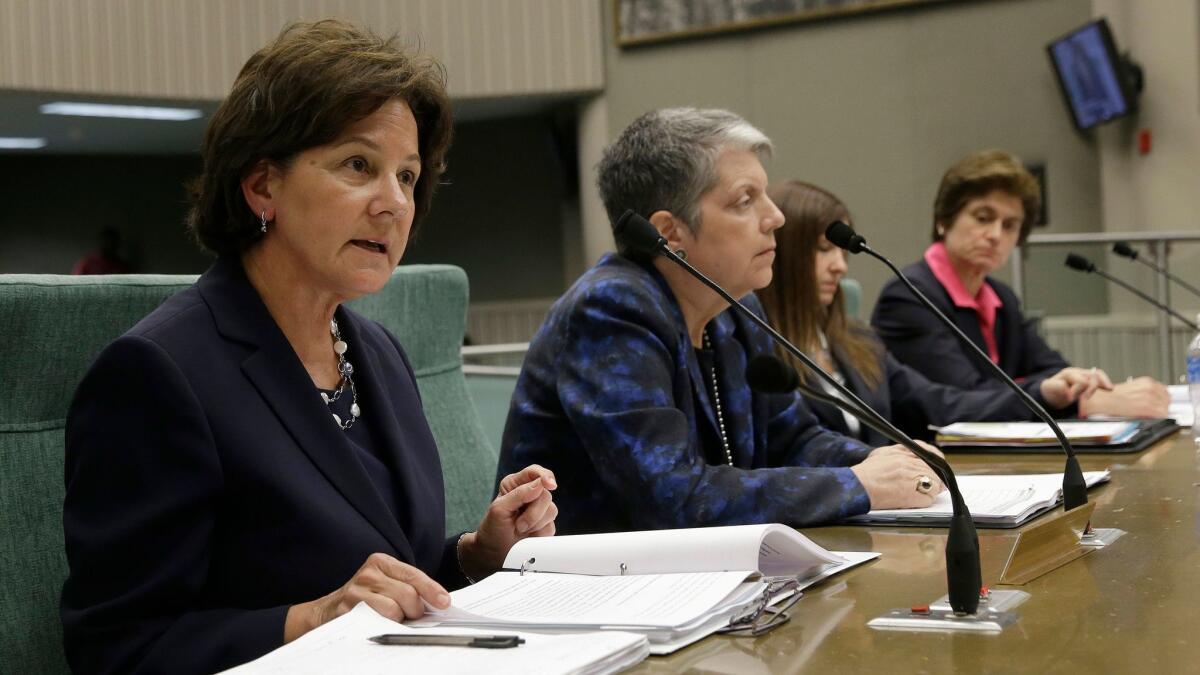UC regents to release findings on whether Napolitano’s office interfered in state audit

- Share via
University of California regents, meeting in San Francisco this week, will release findings of an independent investigation into whether UC President Janet Napolitano’s staff members improperly interfered with a state audit of her office’s operations.
Regents also will discuss a new report that took a systemwide look at how to avoid the kind of enrollment fiasco that was set off by UC Irvine last summer when it abruptly rescinded nearly 500 admission offers, mostly for minor application paperwork problems. The campus came down hard on such things as missed deadlines for verification of senior grades after administrators discovered that about 850 more students than expected had accepted their admission offers. UC Irvine Chancellor Howard Gillman eventually reinstated nearly all the students and apologized for causing them “unacceptable distress.”
The interim report recommends that campuses be barred from using verification of grades as a way of managing enrollment and that they should increase the notices to students about paperwork deadlines. Before withdrawing admission offers, the report suggests, administrators should consider alternative measures, and any rescinded offers should include instructions for how to appeal.
UC Irvine’s initial rescission notices told students the decisions were “final” and did not mention the right to appeal.
UC Irvine was roundly criticized because people believed that administrators were holding the students whose offers were rescinded “to a standard that in any other year would not have been applied,” the report said. “As a result, UC’s legitimate need to verify the academic qualifications of new students was undercut — and UC’s admission process tarnished.”
To look into possible interference in the state audit, regents hired former California Supreme Court Justice Carlos Moreno and the law firm Hueston Hennigan.
State Auditor Elaine Howle sent surveys to administrators at all 10 UC campuses last fall to find out how effective they found Napolitano’s office. Auditors explicitly asked administrators not to share their answers with anyone outside their campuses. But they learned later that central office staff had asked to see the responses.
When Howle publicly contended that “the Office of the President intentionally interfered with our audit process,” the regents ordered the independent investigation.
The Times reported in April that Bernie Jones, Napolitano’s deputy chief of staff at the time, had worked closely with campus administrators in reviewing their survey responses. He told The Times then that he was only responding to requests for help in filling out the 52-page survey and said that he had done nothing improper. He provided emails, along with revised and final copies of some surveys, to support his claim that he never ordered revisions but only asked campus administrators to consider some changes.
UC San Diego administrators, for instance, originally said in their survey response that they were dissatisfied with the Office of the President’s transparency in determining how much each campus paid for systemwide services. But in the final version they gave auditors, they said they were satisfied. Jones said he flagged the initial answer to ask if it reflected Chancellor Pradeep K. Khosla’s view, and that campus leaders changed it, not him.
Both Jones and Seth Grossman, Napolitano’s chief of staff, resigned last week. Jones declined to respond to an email asking if he was stepping down to take responsibility for interfering in the audit. Grossman said through a spokesman that he did nothing wrong and was leaving to take a job in Washington ,as chief of staff and counselor to American University President Sylvia M. Burwell.
“His involvement in the audit was minimal, appropriate and 100% consistent with directives from [UC] internal audit officers and university attorneys,” said Nathan Ballard, Grossman’s spokesman. “If any UC employee did anything wrong, it was without Grossman’s consent or approval in any way.”
More to Read
Sign up for Essential California
The most important California stories and recommendations in your inbox every morning.
You may occasionally receive promotional content from the Los Angeles Times.











